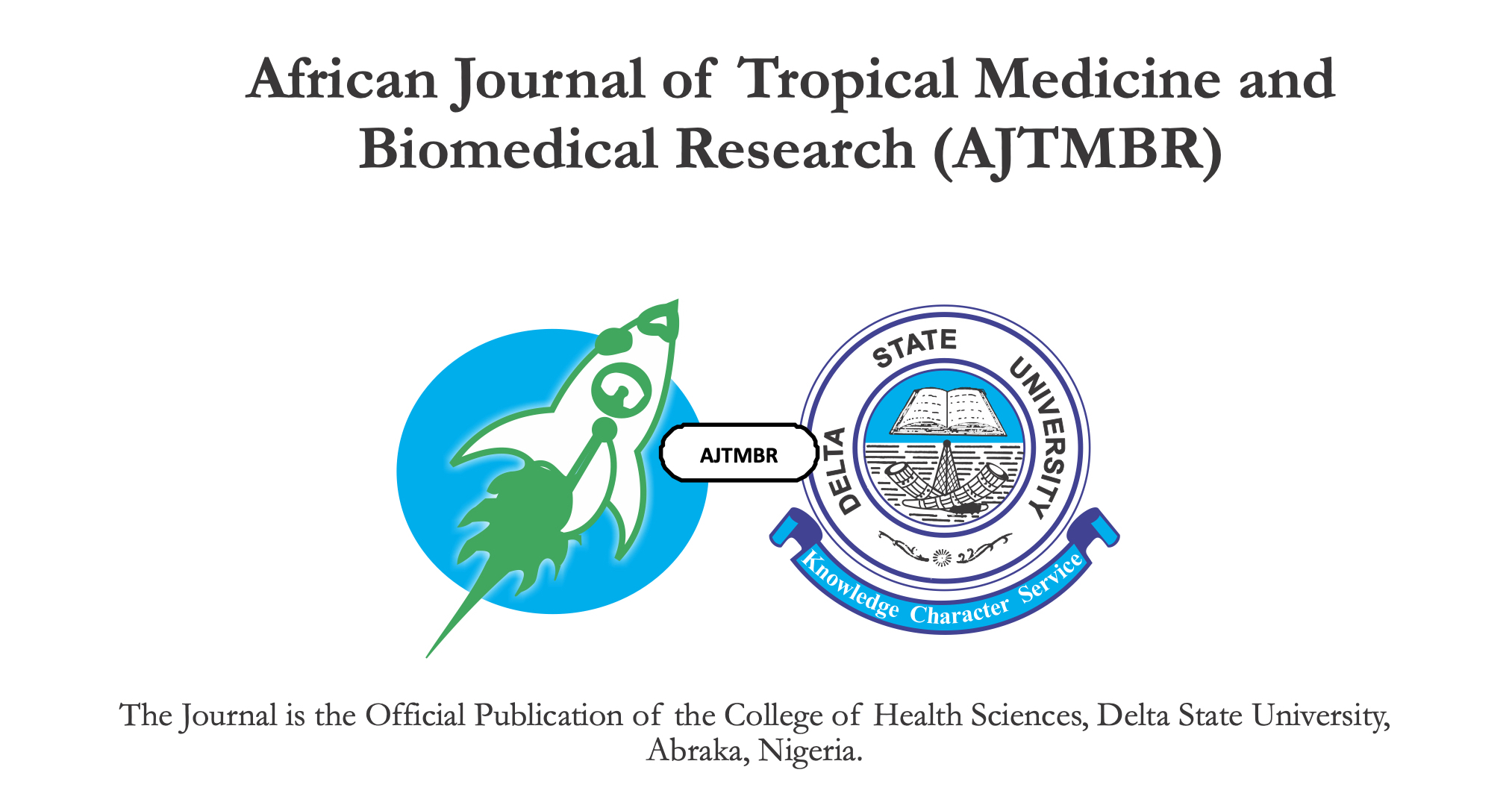Socio-demographic Profile of Older First Time Mothers at the University of Calabar Teaching Hospital, Calabar, Southern Nigeria
Keywords:
PrimiparousAbstract
Objective: The study set out to determine the socio-demographic profile of women who have their first childbirth at age ≥30 years in Calabar, Southern Nigeria.
Methodology: This was across sectional study applying a semi-structured interview.Participants were recruited from the University of Calabar Teaching Hospital over a 5 month period. We compared the socio-demographic characteristics of the primiparous women aged ≥30 years with a control group of multiparous women, also aged ≥30 years, but who had ≥1 previous delivery before age 30.
Results: Eighty-six and 254 women formed the study and control groups respectively. Women in the study group were more likely to have university degrees (P= 0.000) or to still be undergraduates (P=0.0002) than women in the control group. The proportion of women in professional occupations was higher than in the control group (P = 0.047%), while the proportion of housewives was significantly lower (P= 0.002). The proportion of Annang women in the study group was significantly higher than in the control group (P= 0.011), while that of Ibibio women was significantly lower (P = 0.0006). Muslims were significantly less likely to delay motherhood till age 30 (P=0.038), while the differences in Church affiliations for the 2 groups of women were not significant (P>0.05).
Conclusion: Compared to others, university-educated women, women in professional occupations and Annang women living in Cross River State are more inclined to commence motherhood at age ≥30 years.
References
Rao AA. Advanced maternal age and pregnancy In: Medical Disorders in Pregnancy. Pankaj D, Purvi P (Eds). Jaypee Brothers Medical Publishers (P) Ltd.; New Delhi. 2001. 46-52
Organization for Economic Co-operation and Development. Age of mother at first child's birth, 2006. Available at www.oecd.org/eis/social/family/databas e AccessedFebruary2010.
Muganyizi P, Kidanto H. Impact of change in maternal age composition on the incidence of caesarean section and low birthweight: analysis of delivery records at a tertiary hospital in Tanzania, 1999-2005. BMC Pregnancy and Childbirth 2009; 9:30. Available at http://www.biomedcentral.com/1471- 2393/9/30 Accessed February 2010.
United Nations 1996. Concise report on world population monitoring, 1996: reproductive rights and reproductive health. E/CN.9/1996/1
National Population Commission (NPC) [Nigeria] and ORC Macro. Nigeria Demographic and Health Survey 2003. National Population Commission and ORC Macro. Calverton, Maryland; 2004.
Onah HE, Eze JN. Trends in the age of primigravida in Enugu, Nigeria. Trop J Obstet Gynaecol 2002: 19(2): 71-73.
Nwagha UI, Ugwu OV, Nwagha, TU, Anyaehie, USB. The influence of parity on the gestational age at booking among pregnant women in Enugu, South-East Nigeria Niger J Physiol Sci 2008; 23 (1&2):67-70.
Eneh AU, Fiebai PO, Anya SE, John CT. Perinatal outcome among Elderly Nulliparae at the University of Port Harcourt Teaching Hospital. Niger J Med 2004, 13(1): 44-47.
Eke AC, Eleje GU. The pregnancy outcome in elderly primigravida: five year review. FIGO Poster Presentation. Available at http://www.postersessiononline.co m
Gharoro EP, Igbafe AA. Maternal age at first birth and obstetric outcome. Nig J Clin Pract 2002; 5(1): 20-24
Ojo A, Oronsaye U. Who is the elderly primigravida in Nigeria? Int J Gynaecol Obstet 1988; 26(1):51-5.
Mukherjee J, Chowdhury JR. The elderly nullipara outcome. J Obstet Gynecol India 1998; 48: 55-57.
Ilesanmi AO, Fawole O, Olaleye DO, Arowojolu A. Pregnancy outcome in the elderly primigravida. J Obstet Gynaecol 1998; 18 (1): 40-43.
Orji EO, Ndububa VI. Obstetric performance of women aged over forty years. The East Afr Med J 2004; 81(3).
Kemkes-Grottenthaler A. Postponing or rejecting motherhood? Results of a survey among female academic professionals. J Biosoc Sci 2003: 35 (2):213-226.
Vezina M, Turcotte M. Forty year old mothers of pre-school children: A profile. Canadian Social Trends 2009; 88: 33-44.
Beets, GCN. Education and age at first child birth. Demos Bull Popul Soc 1999; 15: 5-8.
Shirahase S. Women's higher education and declining fertility in Japan. Rev Pop Soc Pol 2000;9: 47–63.
Leete, R and Fox J. Registrar General's Social Classes: Origins and Uses. Popul Trends 1997; 8: 1-7.
ErmishJ,OgawaN.Ageofmotherhood in Japan. J Popul Econ 1995; 7: 393-420.
NicolettiC,Tanturri,ML.Differencesin delaying motherhood across European countries: Empirical evidence from the ECHP. Eur J Pop 2008; 24(2): 157-183.
Kantorova V. Education and entry into motherhood: the Czech Republic during state socialism and the transition period (1970-1997). Demographic Res 2004; S3:10: 245-274.
AkpotuN,AkpochafoW.Ananalysisof factors influencing upsurge of private universities in Nigeria. J Soc Sci 2009; 18 (1): 21-27.
Dabalen A, Oni B. Labor Market Prospects of University Graduates in Nigeria. Background study conducted to inform the design of the Nigeria University System Innovation Project. 2000. Available at http://siteresources.worldbank.org/NIG ERIAEXTN/Resouces/labour_market_ univ.pdf AccessedFebruary2009.
Mutihir JT, Maduka WE. Comparison of pregnancy outcome between teenage and older primigravida in Jos University Teaching Hospital, Jos, North-Central Nigeria. Ann Afr Med; 2006; 5(2): 101 - 106
Otieno ATA, Bocquier P. An event history of factors influencing entry into parenthood in Nairobi. African Population Studies, 2004; 19 (2): 43-62.
Olugbile S. Varsity enrolment: Females improve in male dominated courses. Punch Newspapers 2010 Jan 5. (Available at: Accessed March 2010.

Downloads
Published
Issue
Section
License

This work is licensed under a Creative Commons Attribution-NoDerivatives 4.0 International License.
Key Terms:
- Attribution: You must give appropriate credit to the original creator.
- NonCommercial: You may not use the material for commercial purposes.
- ShareAlike: If you remix, transform, or build upon the material, you must distribute your contributions under the same license as the original.
- No additional restrictions: You may not apply legal terms or technological measures that legally restrict others from doing anything the license permits.
For full details, please review the Complete License Terms.



